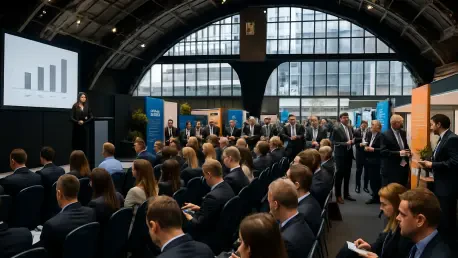In a remarkable milestone for regional economies, Greater Manchester’s business events sector has soared past £1 billion in economic value, underscoring its pivotal role in shaping local prosperity and highlighting the broader trend of business events—conferences, meetings, and exhibitions—becoming powerful engines of growth in urban centers across the globe. This achievement not only showcases the financial impact but also the capacity of such events to foster job creation, tourism, and international recognition. This analysis delves into the data behind Greater Manchester’s success, explores key trends fueling this growth, incorporates expert perspectives, and examines the future trajectory of this dynamic industry.
Economic Impact: Unveiling the £1 Billion Milestone
Key Figures: Breaking Down the Numbers
The business events sector in Greater Manchester has delivered a staggering £917 million in direct economic impact through core activities like conferences and corporate gatherings. When factoring in leisure extensions—where delegates prolong their stays for personal travel—the total economic contribution climbs to an impressive £1 billion. This dual revenue stream illustrates the sector’s multifaceted influence on the local economy, positioning it as a cornerstone of financial vitality.
Beyond monetary value, the industry sustains 31,600 full-time equivalent jobs tied directly to events, with an additional 2,600 roles supported by leisure extensions. These figures, derived from research by Marketing Manchester, emphasize the sector’s role as a major employer. The growth in job opportunities reflects a consistent upward trend in event hosting, amplifying the region’s capacity to support livelihoods through this vibrant sector.
Notably, the data reveals a significant rise in international events and high-value gatherings over recent years. This shift toward global engagement has enhanced Greater Manchester’s reputation as a prime destination for impactful business interactions. The trend of hosting prestigious events signals a promising trajectory for sustained economic contributions in the years ahead.
Local Benefits: Delegate Spending and Ripple Effects
In the current year, Greater Manchester welcomed 51,500 business events, drawing 3.9 million delegates to the region. This influx translates into substantial spending at venues for essentials like room hire, catering, and lodging, directly boosting the hospitality sector. The sheer volume of attendees underscores the scale at which business events drive revenue for local businesses.
The economic ripple effect extends far beyond event spaces, invigorating sectors such as retail, entertainment, and transportation. Delegates’ expenditures on shopping, dining, and local travel create a cascading benefit, enriching diverse corners of the economy. This interconnected impact highlights how business events act as catalysts for broader commercial activity.
Additionally, leisure extenders—delegates who stay longer for tourism—contribute £87.5 million and account for 545,000 bed nights. This spending fuels revenue in accommodation, food and drink, and cultural attractions, showcasing the synergy between business and leisure tourism. Such trends reveal Greater Manchester’s growing allure as a destination that seamlessly blends professional and personal experiences.
Expert Perspectives: The Strategic Importance of Events
Insights from Victoria Braddock, Managing Director of Marketing Manchester, shed light on the sector’s critical role in the regional economy. She notes that business events generate substantial revenue while underpinning thousands of jobs, making them indispensable to local prosperity. Her perspective reinforces the idea that the industry is not just a financial driver but a pillar of community stability.
Braddock also points to Greater Manchester’s diverse venue offerings as a key factor in attracting a wide array of events. From modern convention centers to historic spaces, the region’s infrastructure caters to varied needs, ensuring memorable delegate experiences. This versatility positions Greater Manchester as a competitive player in the global events market.
Moreover, the region’s growing tourism appeal plays a significant role in converting business visitors into leisure travelers. This trend extends economic benefits beyond the duration of events, as delegates explore local attractions and contribute to ancillary sectors. Aligning with regional goals, business events enhance Greater Manchester’s reputation as a hub for innovation and collaboration, further solidifying its global standing.
Future Outlook: Sustaining Momentum in the Events Sector
Looking ahead, Greater Manchester’s business events sector shows strong potential for continued growth, supported by strategic initiatives like the Greater Manchester Strategy for the Visitor Economy spanning from the current year to 2030. This framework prioritizes attracting high-profile international conferences, which could further elevate the region’s economic impact. The focus on such events aligns with a broader vision of establishing a lasting global presence.
Targeting mid-week events presents another opportunity to bolster the local economy by filling gaps in traditional tourism cycles. By hosting more conferences and corporate gatherings during these periods, the region can maximize venue utilization and delegate spending. This approach could drive consistent revenue streams throughout the year, reducing seasonal fluctuations.
However, challenges such as maintaining competitiveness and ensuring adequate infrastructure capacity must be addressed to sustain this growth. Balancing these hurdles with benefits like increased global visibility and repeat visits will be crucial. Strategic investments in facilities and marketing could help navigate these obstacles, ensuring the sector remains a key driver of regional success.
Reflecting on a Transformative Trend
Looking back, the journey of Greater Manchester’s business events sector to a £1 billion economic impact marked a defining moment in regional development. The dual contributions from direct event spending and leisure extensions painted a picture of a multifaceted industry that touched nearly every aspect of the local economy. Job creation, with over 34,000 roles supported, stood as a testament to the sector’s profound influence on livelihoods.
Moving forward, stakeholders should prioritize targeted investments in infrastructure and promotional efforts to maintain this momentum. Collaborating on innovative event formats and sustainable practices could further distinguish Greater Manchester as a leader in the global events landscape. By embracing these steps, the region can ensure that the legacy of this economic powerhouse continues to shape prosperity for years to come.









